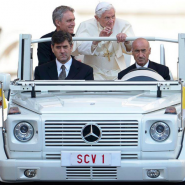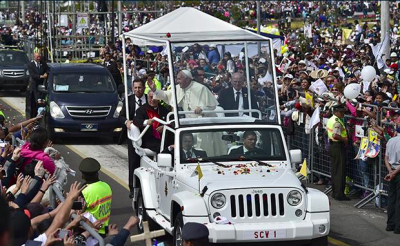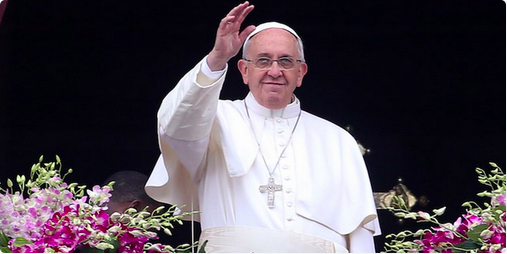 Mercedes Popemobile
Mercedes Popemobile
German automaker Mercedes-Benz is looking a little less holy with the loss of one noteworthy fan: the pope.
Pope Francis has elected for a Jeep Wrangler for his upcoming United States visit from Sept. 22-27, perhaps to align himself more closely with the average worker. The lack of such prominent product placement and endorsement from such a widely respected and revered figure may lead Mercedes to look elsewhere to align their image with all that is good and holy.
Highway to hell
Mercedes has been providing “popemobiles” for about as long as popes have had them – about 80 years – and Pope Benedict XVI had a clear preference for a Mercedes-Benz M Class.
This is not the first time Pope Francis has opted to scale down in comparison to his predecessors. In addition to using a Jeep Wrangler similar to the one slated for the upcoming U.S. trip in Ecuador, a convertible Hyundai Santa Fe has been a recurring ride for his holiness, and last year’s trip to South Korea even saw him in a Kia.
Pope Francis in a Jeep Wrangler
The scaling down may be an attempt by the Pope to relate to the average American, hence his choice of a Jeep, and it fits into the humble image he cultivates with his restrained robe, his choice to live in a guesthouse in the Vatican and his preference for public transportation dating back to his days as a cardinal. Pope Francis is expected to endorse a U.N. document that aims to eradicate poverty by 2030, so it may be in his best interest to avoid luxury vehicles for the time being.
It is difficult to determine what effect, if any, the shift will have on Mercedes, but a recent report by Shullman Research Center found that affluent consumers are more likely to be swayed by celebrity endorsements. While not an endorsement per se, an association between the Pope and Mercedes-Benz may have made the vehicle a worthwhile investment for some of his followers worldwide.
Pope Francis
Also of note, there are approximately 1.2 billion Catholics in the world, including half a billion in Latin America and more than 100 million in the emerging luxury market of Brazil.
The loss of the sponsor may dissociate Mercedes-Benz from benevolence and lead it to build a socially conscious image in other ways, such as through environmental advances or charitable contributions.
Stairway to heaven
Although celebrity endorsements are common practice in other luxury sectors, particularly those related to fashion, they are more rare in the automotive industry.
In an exceptional occurrence, from Sept. 2013, British automaker Bentley Motors elevated its partnership with Swiss watchmaker Breitling by touting soccer star David Beckham as the campaign’s ambassador.
The Breitling for Bentley collection features numerous automotive-inspired watches that has likely attracted automotive fans. Mr. Beckham had previously acted as Breitling’s global brand ambassador, so extending his presence to Bentley signaled the strong rapport between the two brands (see story).
Instead, automakers tend to associate their brand with an image or experience in other ways.
For example, German automaker Audi is the luxury automotive sponsor of Greenwich Polo Club’s East Coast Open, one of the United States’ most prestigious polo competitions.
Guests will have the opportunity to meet polo stars and participate in various activities at a number of unique Audi-supported hospitality events. The sponsorship further cements Audi’s ongoing association with and support for polo (see story).
Final Take
Forrest Cardamenis, editorial assistant on Luxury Daily, New York


